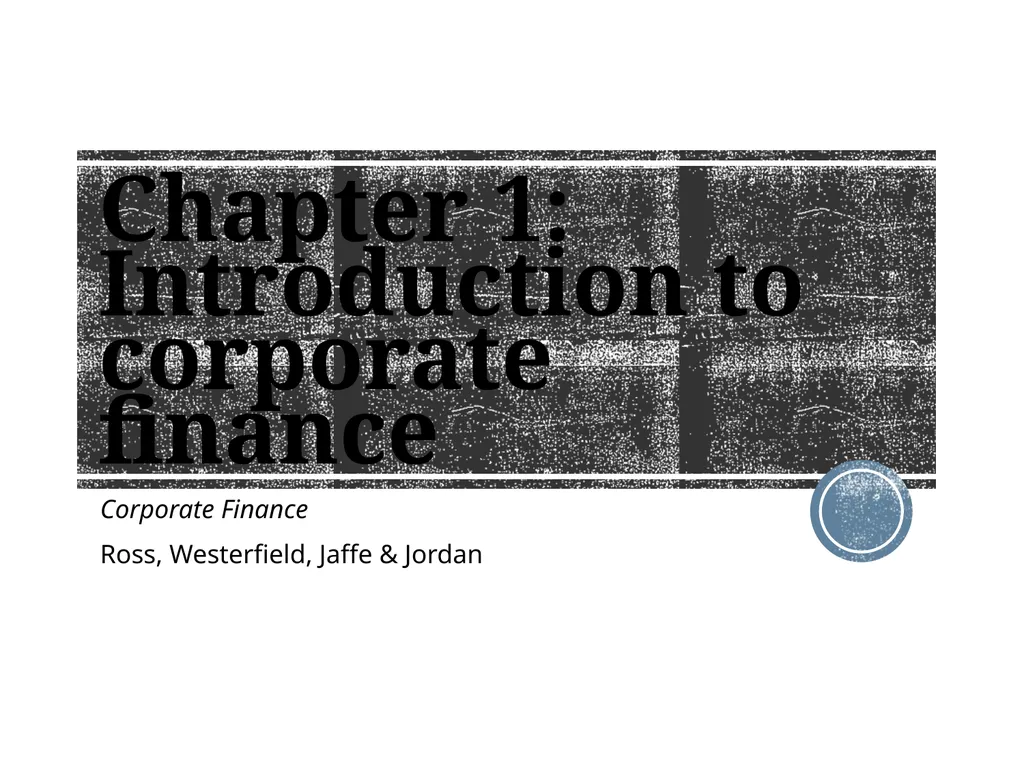Chapter 1: Introduction to corporate finance
Author : pamella-moone | Published Date : 2025-05-17
Description: Chapter 1 Introduction to corporate finance Corporate Finance Ross Westerfield Jaffe Jordan Outline I What is corporate finance II The importance of cash flows III The goal of financial management IV The agency problem and control
Presentation Embed Code
Download Presentation
Download
Presentation The PPT/PDF document
"Chapter 1: Introduction to corporate finance" is the property of its rightful owner.
Permission is granted to download and print the materials on this website for personal, non-commercial use only,
and to display it on your personal computer provided you do not modify the materials and that you retain all
copyright notices contained in the materials. By downloading content from our website, you accept the terms of
this agreement.
Transcript:Chapter 1: Introduction to corporate finance:
Chapter 1: Introduction to corporate finance Corporate Finance Ross, Westerfield, Jaffe & Jordan Outline I. What is corporate finance? II. The importance of cash flows III. The goal of financial management IV. The agency problem and control of the corporation V. Ethics, sustainability, and corporate governance VI. Financial markets Main tasks of corporate finance Capital budgeting: the process of planning and managing a firm’s long-term investments fixed assets. Example: deciding whether or not to open a new restaurant. Example: deciding whether or not to introduce a new line of products. Capital structure: the mixture of debt and equity maintained by the firm S-T and L-T debt and equity. Working capital management: a firm’s short-term assets and liabilities current assets and current liabilities. The Capital Budgeting Decision Current Assets Fixed Assets 1 Tangible 2 Intangible Shareholders’ Equity Current Liabilities Long-Term Debt What long-term investments should the firm choose? Modern forms of firms Corporation: a business created as a distinct legal entity composed of one or more individuals or entities, e.g., IBM. Separation of control (shareholders) and management (professionals). Ownership can be easily transferred. Limited liability. Double taxation. Rather expensive to form. Agency problems. Who make the decisions? Owners (typically in small businesses). Professional managers. Financial managers Frequently, financial managers try to address these tasks. The top financial manager within a firm is usually the Chief Financial Officer (CFO). Treasurer – oversees cash management, credit management, capital expenditures and financial planning. Controller – oversees taxes, cost accounting, financial accounting and data processing. How do financial managers create value w.r.t. cash flows? The firms must create more cash flows than it uses. Specifically, 1. Select/acquire assets that generate more (discounted) cash flows than they cost. 2. Sell bonds and stocks that raise more cash/capital than they cost. Cash flow from firm (C) The importance of cash flows Taxes Retained cash flows (E) Invests in assets (B) Dividends and debt payments (F) Current assets Fixed assets Short-term debt Long-term debt Equity shares Ultimately, the firm must be a cash-generating activity. The cash flows from the firm should exceed the cash flows from the financial markets. Cash for securities issued by the firm (A) Possible goals of financial management Survive Beat the competition Maximize sales Maximize net income Maximize market share Minimize costs Maximize the value of (stock) shares The “appropriate” goal of financial management Maximize the (fundamental or economic) value of














